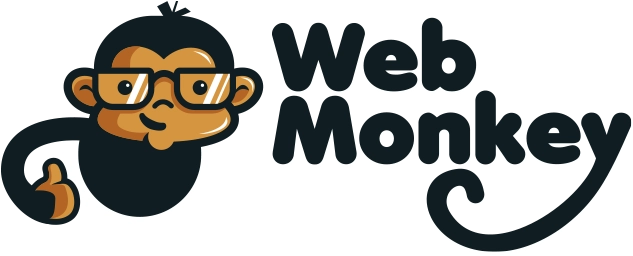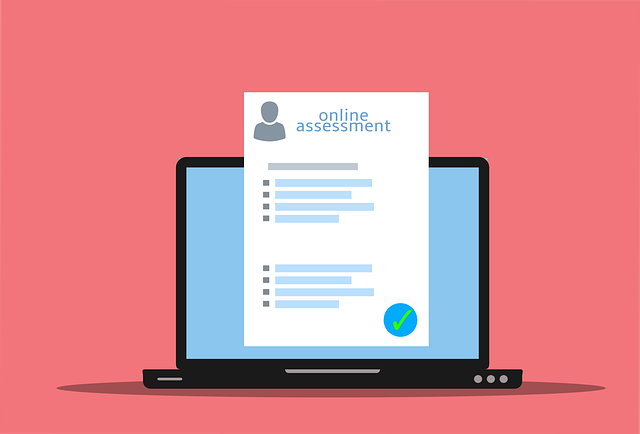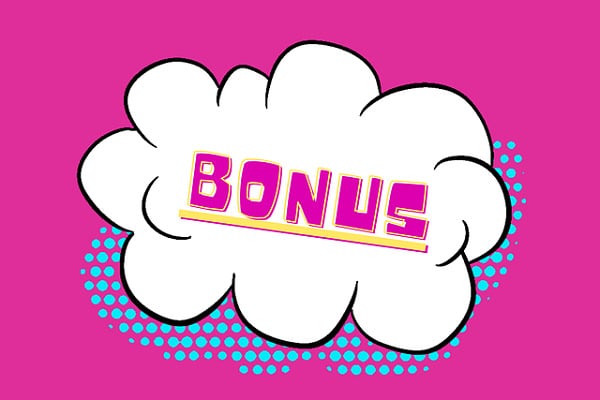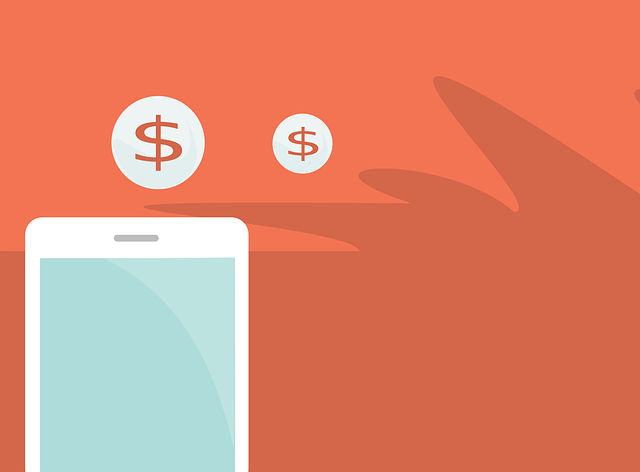Blogging vs YouTube – My Experience With Both Platforms (Pros & Cons)
Let me start out by saying that I have been blogging for more than two years, while I only started my YouTube channel two months ago.
I absolutely love blogging, and I think it's an awesome way to make money online and to learn more about the world of digital publishing and SEO.
But, at the same time, I am having a tonne of fun making my first YouTube videos. Plus, I think starting a YouTube channel is also an excellent way to learn about video editing, shooting, production, and YouTube SEO (which is important).
So, today I thought I'd write a bit of a blogging vs vlogging, or blogging versus YouTube post (since YouTube is pretty much where everyone vlogs anyway) to share my thoughts on both platforms.
Spoiler: I think starting both platforms is worthwhile, but I think it's critical to approach these projects in the right way and at the right time.
Time to break down the whole blogging vs YouTube debate and some facts that beginners should consider.
Blogging Vs. YouTube – What's The Difference?
Blogs have been around pretty much since the dawn of the internet.
What might surprise you is that vlogging, or video logging, has also been around for ages. Although, it's important to note that vlogs really took off in 2005 with the dawn of YouTube.

The main difference between blogging and vlogging comes down to medium; blogs are their own site (when self-hosted, which is ideal), whereas vlogs are typically hosted on YouTube or other streaming platforms.
You can blog or vlog about anything, so content isn't the differentiating factor here.
It's really all about if you produce written content or video content. Given the popularity of YouTube for vlogging, this is again why this is more of a blogging vs YouTube debate for content creators.
Personally, I think the most interesting bit of data between blogging vs YouTube boils down to this interest-over-time graph from Google Trends:
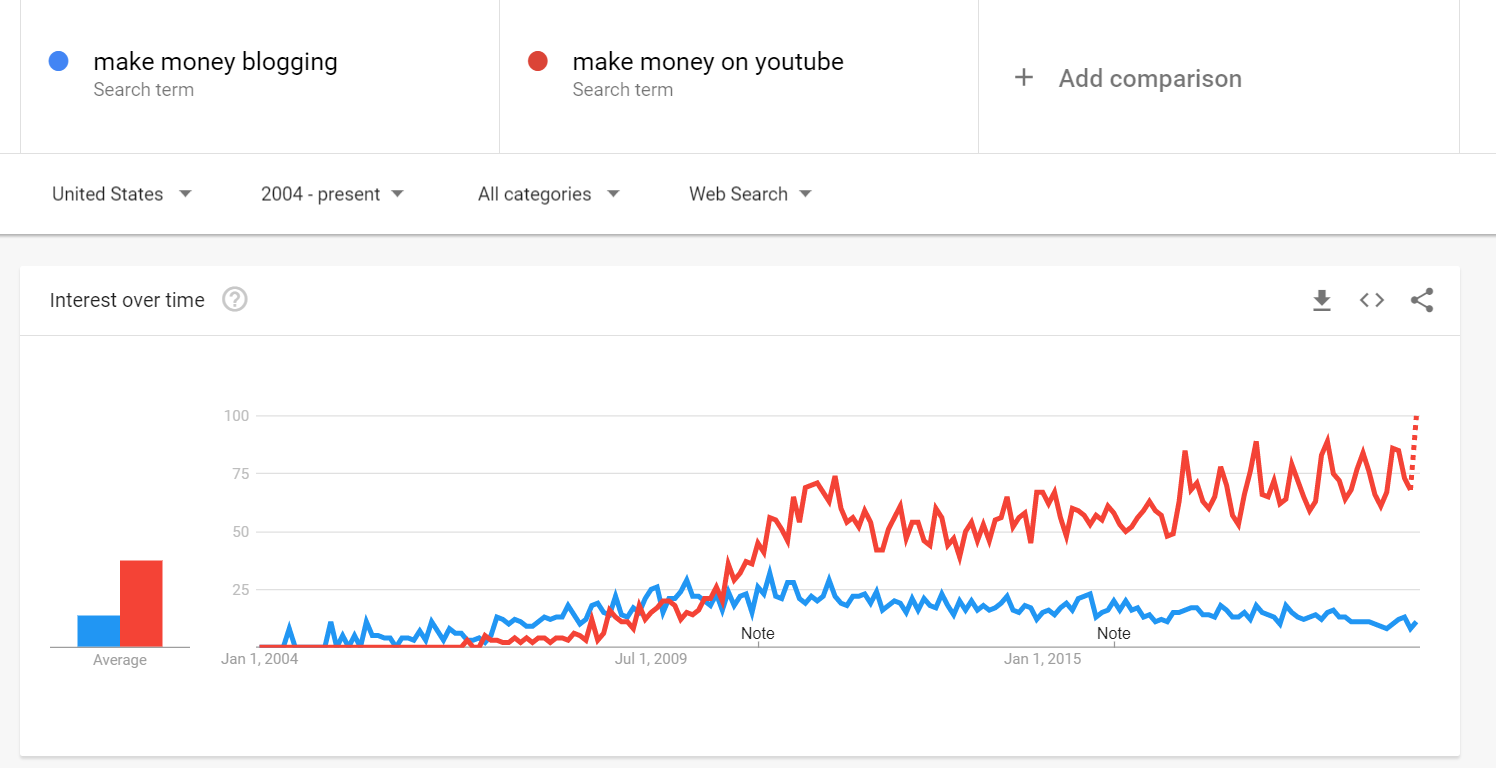
It's clear that as an income source, starting a blog dominated the first decade of the 2000s.
But, it definitely seems like we are living in more of a YouTube era now.
The question is: does this make sense, and what should beginners know about the monetization and growth potential of each platform.
Let's get started by comparing my first few months of blogging to what I'm seeing with my new YouTube channel.
Blogging vs. YouTube – My Early Results
Let's take a little trip down memory lane and look at the first few months of WebMonkey in terms of traffic and revenue.
Within the first 2 full months of blogging, I hit approximately 3,500 total sessions:

And, if we look at the traffic breakdown, I'm actually pretty surprised at how diverse it was and how much organic traffic had already developed back then:
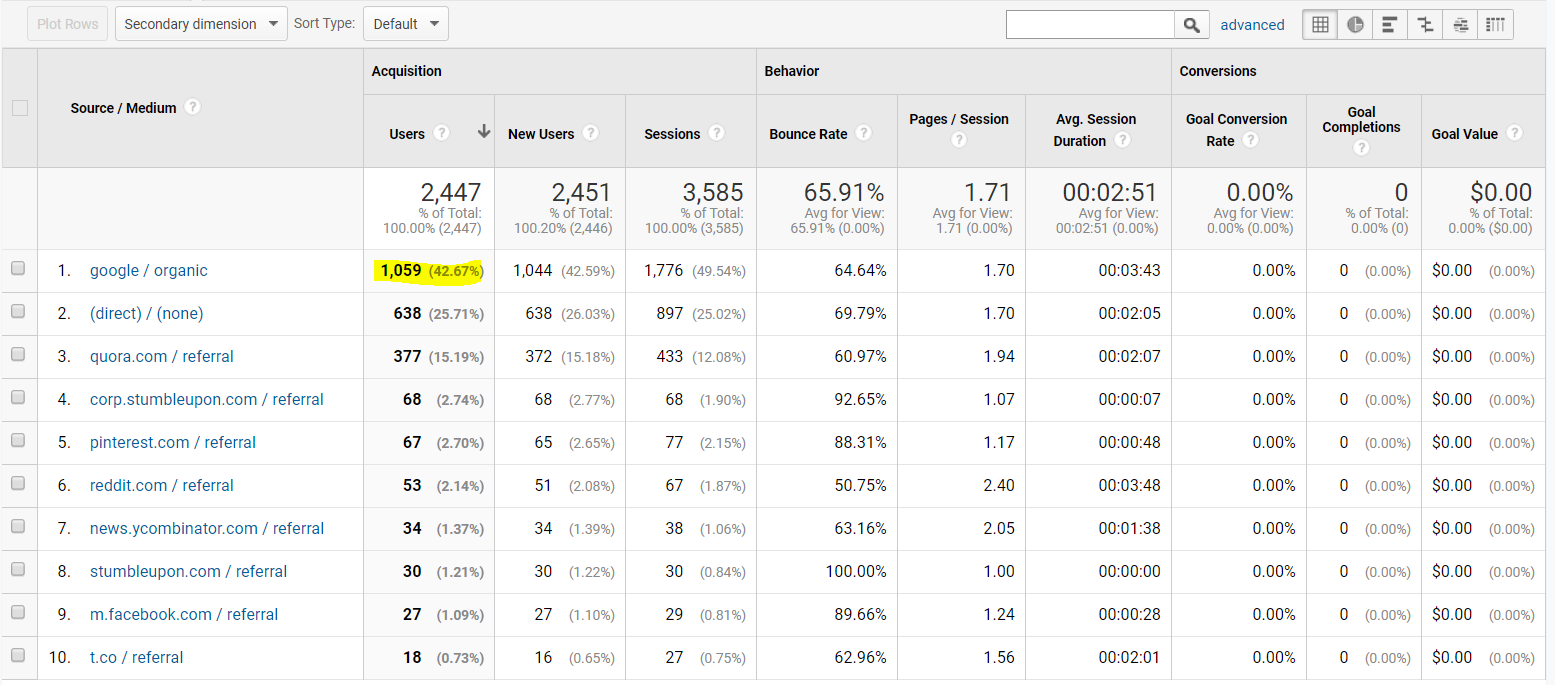
Additionally, I even earned a little over $60 in that time from a SiteGround referral and some Amazon Affiliate income.
By August, I was starting to average 20,000 page views a month and was steadily making $300+ a month from blogging. Now, there's a few things I want to clarify first about these early blogging days since I think the results are, in all honesty, quite lucky.
Firstly, I was lucky to start my blog about phone farming because this turned out to be a catalyst for getting a base of organic traffic and tonnes of backlinks.
Secondly, thanks to my friend Peter from Dollar Sanity's advice, I got onto Quora marketing very early on.
Aside from these two facts, I also worked like an absolute dog and completely neglected my college studies during this time to focus on growing my website (#NoRegrets).
So, all-in-all, we're talking dozens if not possibly over a hundred hours for the first two months of result, some niche selection luck, and stellar mentoring from Peter. Please keep this in mind
Let's take a look at how the first 2 months of YouTube have gone for a quick comparison.
Early Signs From YouTube
As I'm writing this, here are some stats about my channel:
- Videos – I have published 7 videos within the first 2 months of my channel.
- Subscribers – I have 61 subscribers.
- Views – I have approximately 1,600 views.
- Watch Time – I have over 91 hours of watch time.

Now, I want to clarify a few things quickly since obviously, you have an advantage with whatever you start second since you can use your prior knowledge, audience, and resources to spur growth.
Firstly, I have spent way less time on my YouTube channel within the first 2 months than my blog. If I had to guess, it's probably been about 25-35 hours to learn the ropes, record, edit, and upload everything.
Secondly, only a small portion of traffic has actually come from WebMonkey or my social media pages:
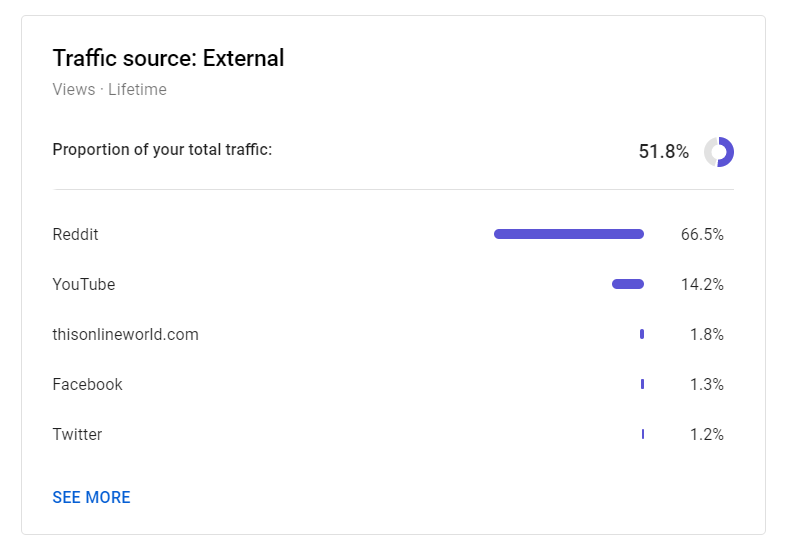
Now, I will say that my pages and blog have helped to get subscribers off of the ground. My friend Ben has also been invaluable in teaching me how to get started on YouTube.
But, shamelessly link dropping on Reddit has done the majority of heavy lifting in terms of getting views.
Again, my prior knowledge about how to market on Reddit has helped, but I digress.
One other important fact is that my YouTube channel has generated $0 revenue on it's own.
It's driven some traffic back to WebMonkey and had an affiliate conversion. Additionally, I also converted one of the videos to a Mediavine video and show it on my Medium guide (where it makes money with ads).
But, for a new channel, none of these options would be on the table, so let's consider this a zero-revenue channel so far.
So, where are the other views coming from?
Well, let me tell you, the following YouTube SEO facts are going to BLOW YOUR MIND!
Blogging Vs. YouTube – SEO & Organic Reach
Today was honestly the first time I dove into my YouTube analytics, and I have to say, I'm shocked.
YouTube is immensely beginner friendly for two reasons.
Firstly, your immediate organic reach as a YouTuber is pretty impressive. These are the stats for my first videos:
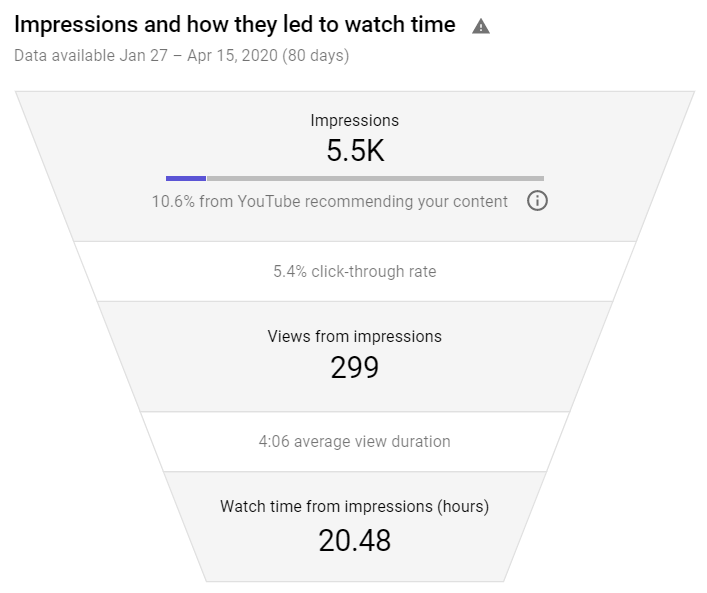
5.500 people have seen my thumbnails somewhere on YouTube.
If I actually knew how to design decent thumbnails, we might be getting somewhere in terms of traffic!
YouTube does a pretty decent job at getting your content out there if you follow simple practices like using low-competition, highly searched for keywords. Nothing ground-breaking here.
I use TubeBuddy, a keyword and SEO YouTube research tool, to plan out my videos. This freeium tool is perfect for beginners, and I mention it here just to show that I'm not using any top-secret tool to find keywords or anything like that.
What is shocking to me, however, is the types of keywords that my content is slowly ranking for:
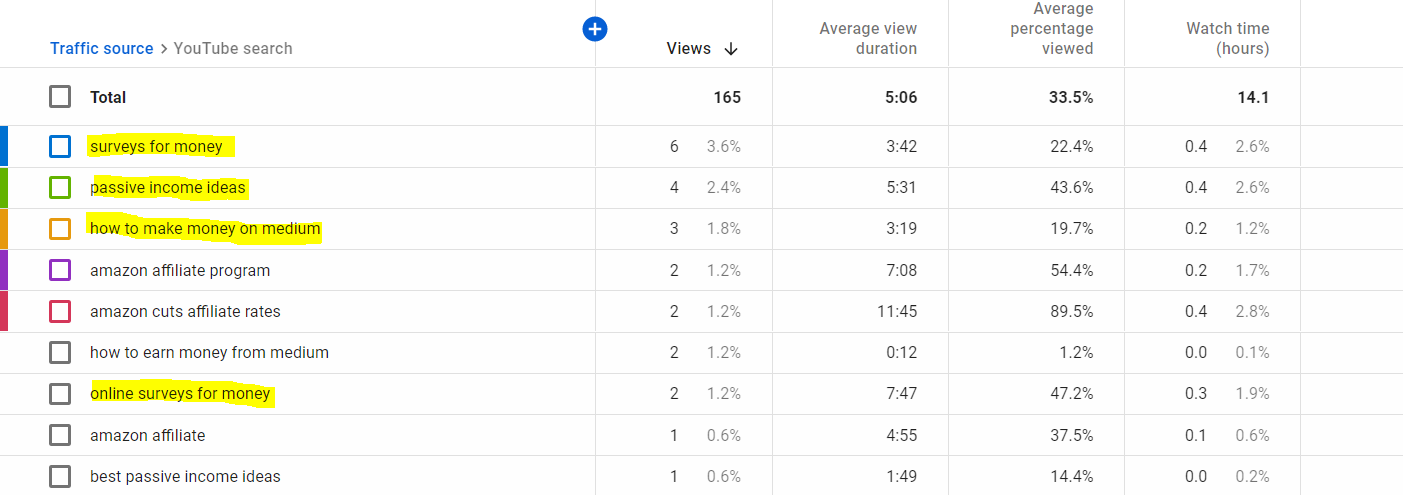
I say ‘ranking' generously of course since this isn't a lot of traffic, but just take a look at those highlighted terms.
Passive income ideas? Are you KIDDING me? I can't even rank for this now on WebMonkey.
Surveys for money, or online surveys for money..again, competitive keywords.
And don't even get me started on how to make money on Medium. I legitimately had to make over $1,000 on Medium, re-write that post 4 times, and build dozens of backlinks to rank high on Google for that term.

The point is: YouTube is competitive, but not as competitive as Google Search.
You can get traffic from YouTube search on more competitive keywords faster than you can with a blog. I've already gotten search views on videos I posted a few days ago.
On average, this means that starting a YouTube channel is more beginner-friendly than starting a blog. In terms of the blogging vs YouTube debate, I give YouTube the edge here, and this is a pretty massive edge.
But, let's break down more of the pros and cons between each platform.
YouTube Vs Blogging Income – 2021 Update
It's been a while since I've updated my blogging vs YouTube progress.
But, things have changed quite a bit since I originally published this post!
For starters, in 2020, WebMonkey made over $22,000 in revenue!
Most of this income came from Mediavine ads, with the rest then coming from affilate marketing and writing on Medium:

However, my YouTube channel hasn't been slacking either!
Since publishing this post in 2020, my YouTube channel has grown to nearly 10,000 subscribers and earned almost $4,000 in 2020.
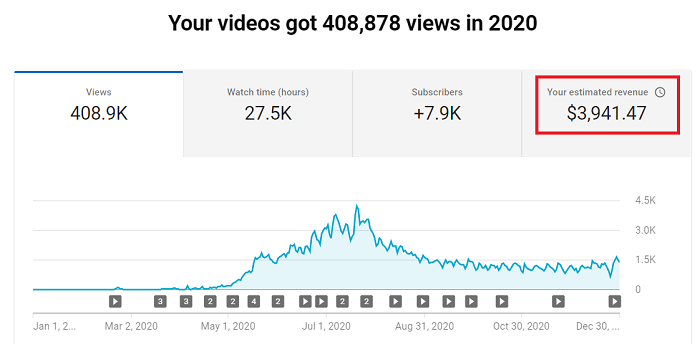
All in all, I have to say I'm amazed at how fast YouTube was able to turn into an additional income source just from one video taking off.
As I'm about to dig into in the pros and cons section below, YouTube has immense snowballing potential; a single video can launch your channel to a point you wouldn't have thought possible.
So, for the whole blogging vs YouTube income debate, I think blogging is faster income because you can start monetizing with ads and affiliate links more quickly.
But, I think YouTube has more earning potential, more volatility, and is likely more profitable in the short to medium-term for people.
Pros & Cons – Blogging Vs YouTube
A quick side note: there isn't a right answer here of course.
Ryan Scribner, a finance YouTuber with 600K subscribers, started his YouTube channel before getting into blogging.
My friend Ben is also crushing it on YouTube, and his other project is a digital marketing agency and podcast.
The main point is really to stick with something until it reaches a point where you can outsource a lot of the workload to continue growing while taking on a new business line.
Since I outsource a lot of my content writing now, it's a good fit to try out YouTube. I imagine Ryan is investing into his new website as well.
But, if you are starting from scratch and want to decide between starting a blog or starting a YouTube channel, here are some pros and cons to consider.
Monetization Speed – Blogging Usually Wins
To make money on YouTube through ads, you now require 1,000 subscribers and 4,000 hours of watch time.
It took my friend Ryan 4 months to reach 1,000 subscribers, and he was grinding on Twitter to get followers. The reality is, most channels will take a while to earn anything.
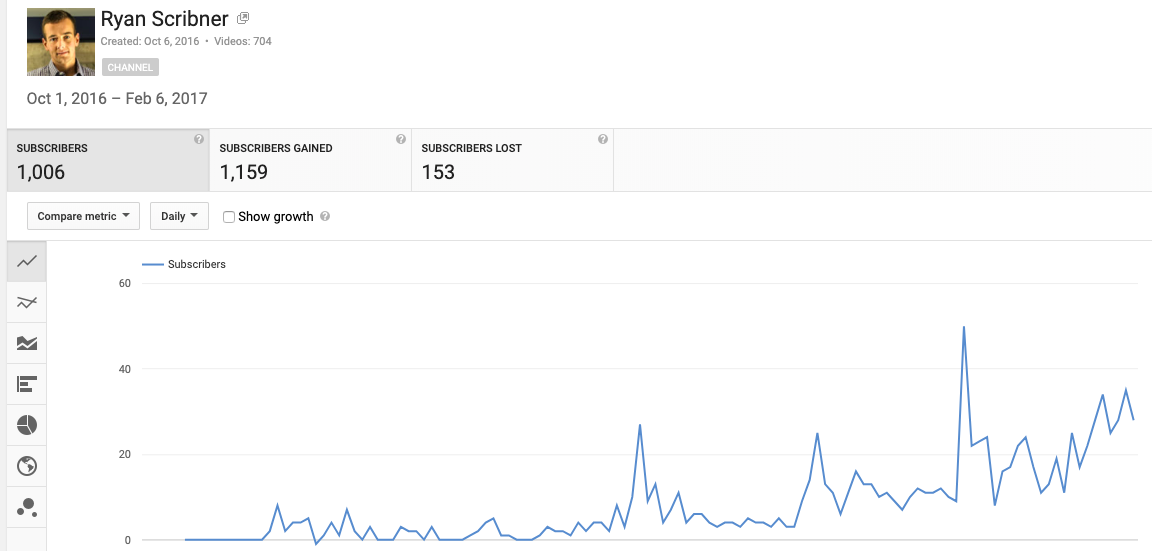
Yes, you can place affiliate links in the description box, but some premium affiliate networks want you to have a website or significant traffic to get started.
In contrast, blogs can get approved for networks like Google Adsense fairly quickly, as well as affiliate networks. The first $100 a month in blog earnings isn't unattainable at all.
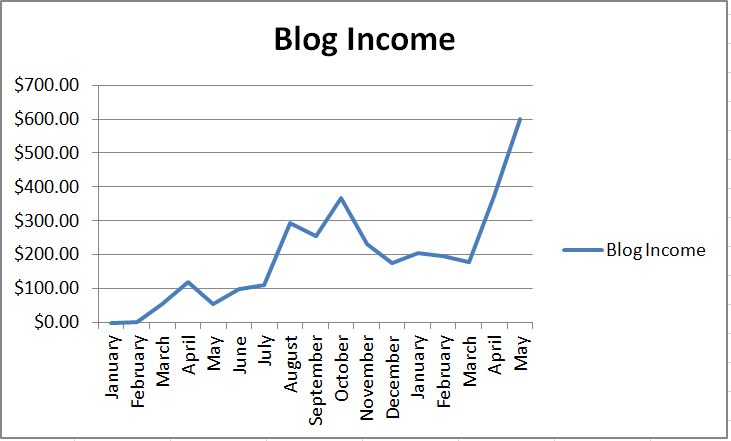
Scaling to my first $1,000 took quite a while, but blogging also has a wide range of ways you can make money, which is nice:
You can make money on YouTube with affiliate links and sponsorships as well, but I think getting your foot in the door as a blogger is a bit quicker for each of these methods (I started getting emails for sponsored posts within the first 3-4 months of starting WebMonkey).
Startup Cost – Blogging Definitely Wins
Blogging and YouTube both require an investment to start.
There are some content creators who disagree, and state that you can start a YouTube channel with just your phone or begin with a free blogging platform, but I don't think this is the case for most people.
Realistically, you will have to put some money into either a blog or YouTube channel to keep up with the competition.
Let's take a look at some costs to expect:
Blogging Costs
- Hosting – Expect around $120 for two years of SiteGround hosting (if you use their promo for signing up).
- Domain Name – If you buy a basic domain name that isn't aged or super premium, you're probably looking at around $12.99 per year.
- A Paid Theme – This isn't a requirement, but many bloggers buy a paid theme to avoid some of the limitations of free themes. This usually ranges from $29 to $80 or so.
Total Cost – $150 to $200.
YouTube Costs
Unless you create content that is purely animated, you'll need a camera and microphone to start a YouTube channel.
Again, some people find success with just a phone, but I think 720-1080p is already the standard, and you place yourself at a disadvantage out of the gate if you don't use any equipment.
Note: the only exception here might be if you have the latest iPhone or a phone with an unreal camera. Then, you could start your channel for a cheaper amount since you'd just need a simple microphone and maybe some lighting.
Anyway, here is my current budget YouTuber setup:
- Sony A6000 Camera – $495.
- Audio-Technica AT2005 USB Microphone – $80.
- Wondershare Filmora for Video Editing – $60.
- Joby GorillaPod Camera Stand – $15.
Total Cost – Approximately $650 for my budget YouTube setup.
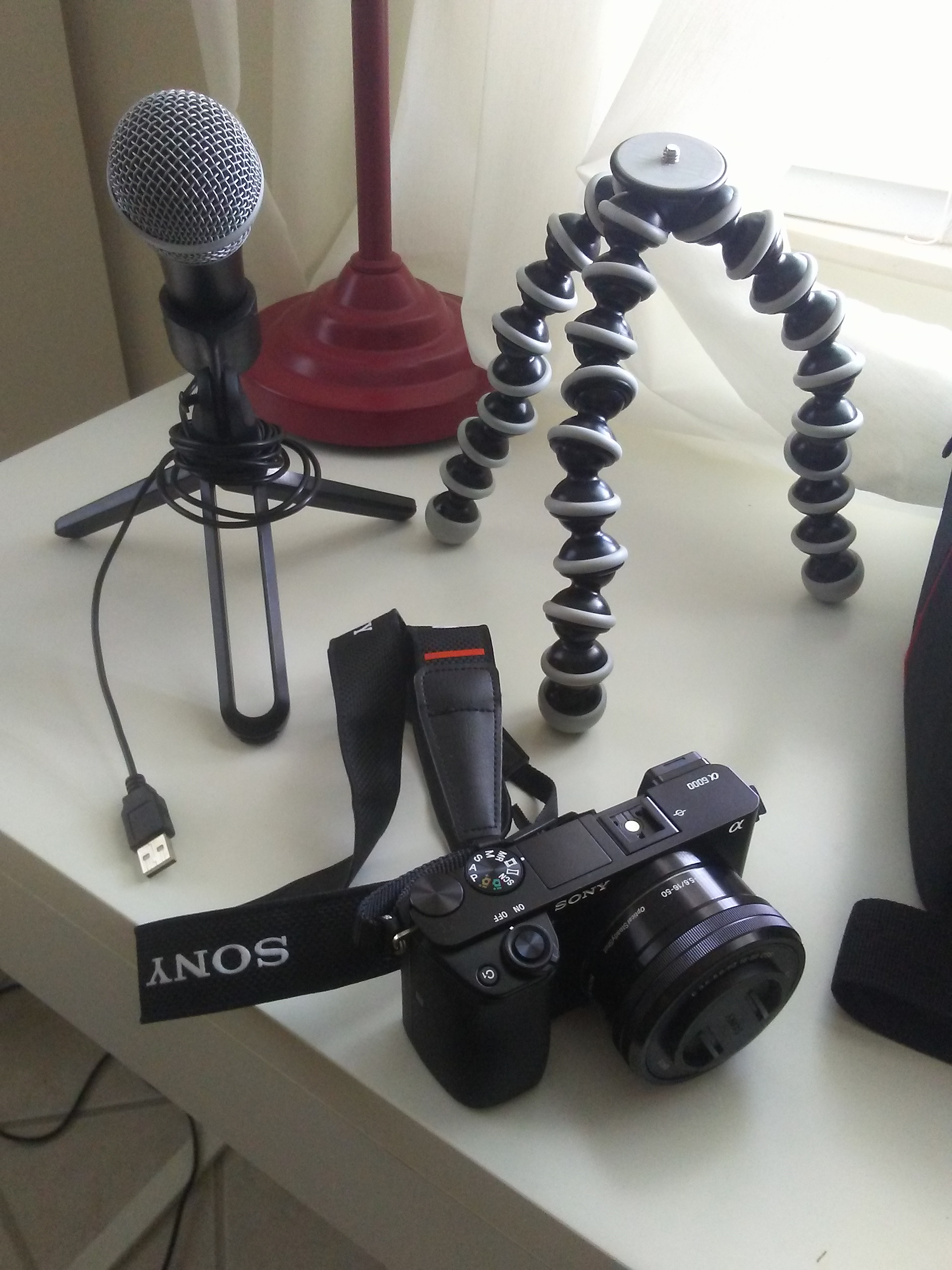
Again, you can probably find better deals or a slightly cheaper setup, but the camera cost is definitely a major expense to consider.
If you can start your channel by borrowing a camera from a friend, this is a great move.
Scaling Speed – YouTube Probably Wins?
Based on my early experiences, my bet would be that starting a YouTube channel is probably a faster route to views than starting a blog.
I got lucky with the start of WebMonkey, and I'm also blown away by the types of keywords I'm already getting traffic from on YouTube.
Again, I think blogging is a faster route to income, but I think YouTube has a higher chance of snowballing. Besides, we hear of viral videos all the time, but viral blog posts? Definitely not as common.
The potential to snowball is why I think getting into YouTube is worthwhile for content creators. But, the next two reasons are why I'm most happy to have started blogging first.
SEO Benefit – Starting With Blogging Helps YouTube Growth
There's actually a lot of effort that goes into proper YouTube SEO from what I've heard and learned lately.
Here are a few elements of YouTube SEO that are important:
- Keyword research – again, I recommend checking out TubeBuddy.
- Increasing audience watch-time/retention on your videos.
- Comments, likes, shares, and subscriptions following a video.
- Your video click-through-rate (CTR).
- Video length – longer videos give you more opportunity to retain users, get more watch time, provide more value, etc.
- Tags, video description, video title, and even saying your keyword during a video to let automatic captioning use the keyword.
These are all factors you control on YouTube.
However, embedding your YouTube videos on other websites, forums, or social media also helps your video. This is because you can get more views, increase engagement, and drive traffic to your channel.
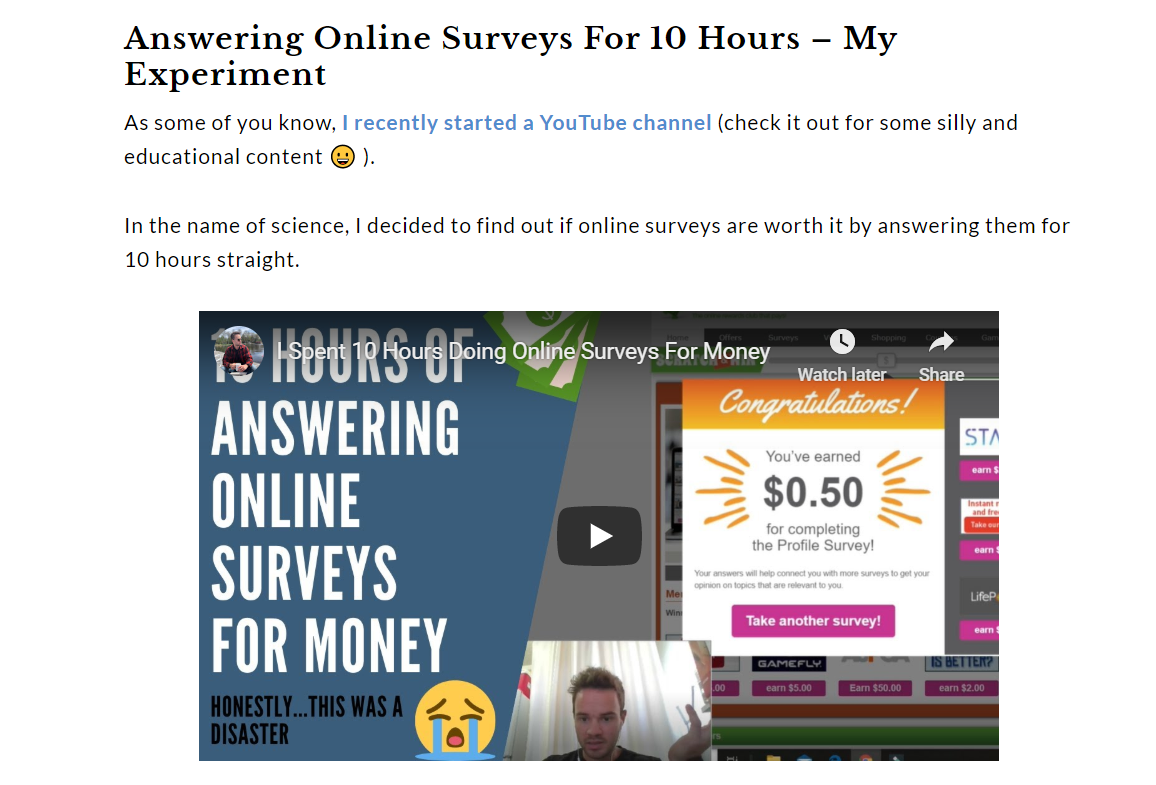
Therefore, having a blog or presence on a platform like Quora is very useful as a beginner YouTuber since you can help boost the SEO profile of your first videos.
If we consider the flip-side, starting a YouTube channel first lets you place links to your blog in 3 places: your video descriptions, your About Page, and in your channel links box.
However, only the first link in your links profile is a do-follow link. The rest are no-follow.

Now, no-follow links still have value. They can drive traffic just as well as do-follow links, and getting a link to your blog is never a bad thing (unless it's a spammy link).
But, YouTube channel with very few views won't do too much to help a blog grow. On the flip side, a blog is, in my opinion, a much easier way to embed YouTube videos on highly relevant blog articles and to drive traffic to a new channel.
Exit Strategy – Selling Your Work
People sell websites all the time, often for multiples of 20-50x monthly average profit according to Ahrefs.
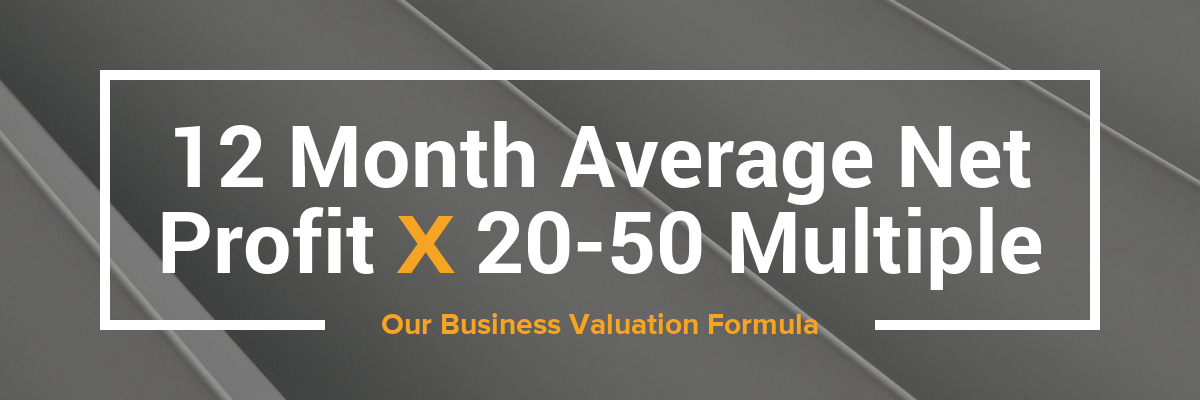
I know a few people who have sold their blogs as well for some hefty figures.
You can checkout my first ever Young Money interview for an example or read how my friend Marc from VitalDollar sold blogs for more than $1 million.
The point is, it's relatively easy to sell a profitable blog.
Selling a YouTube channel on the other hand is much more unlikely. In fact, it's against YouTube/Google terms and services.
People still sell YouTube channels on forums or backdoor deals, but it's risky, and it also depends on the type of channel you have. If you're a vlogger, you're the face of your channel, so good luck getting rid of it down the line if you want fast cash.
Networking Potential – Blogging & YouTube Are Tied
There's no clear winner in term of what's better for building your network or opening the door to more opportunities.
Finding your place in a niche with blogging or YouTube is awesome either way.
Meeting new and highly talented people is an awesome way to learn, and you can also pass on your knowledge to others to form new partnerships.
Plus, as mentioned, both blogging and YouTube teach you a wide variety of skills that are useful for the world of digital publishing and marketing. There's really no downside from an education perspective for either medium.
Should I Start A Blog Or YouTube Channel?
Ultimately, your content and preferences go a very long way in deciding if you should start with blogging or YouTube.
If you make how-to content or are starting in a niche that perhaps lends itself well to going for that viral hit, YouTube might be worth starting out with first.
If you love writing, cover in-depth topics that you're very knowledgeable in, and don't want to get into videography/editing/buying a camera, blogging seems like a better fit.
Now, competition is probably a factor as well.
Based on the early signs I'm seeing for my YouTube keyword rankings, if you want to cover a highly competitive niche, YouTube might be easier than starting a blog.
Extra Reading – Should I Start A Blog Or Podcast?
Final Thoughts – Why There's No Right Answer
Originally, I wanted to write this post about why blogging wins out in the blogging vs YouTube debate for anyone sitting on the fence. However, this was just my initial bias clouding my vision.
There are so many benefits to starting a blog or starting your YouTube channel, and each platform has a variety of pros and cons.
Blogging is cheaper to start, easier to sell, and I think the route to earning your first online paycheck is faster too.
In contrast, YouTube is easier to snowball, less competitive for organic views, and has that element of virality that you just can't dismiss.
From a SEO perspective, I do think that having a blog in your back pocket helps a new YouTube channel get up and running faster compared to the reversal situation, but again, there are exceptions to this…if your channel goes viral, you can probably start a blog pretty quickly.
The only critical part to remember is this:
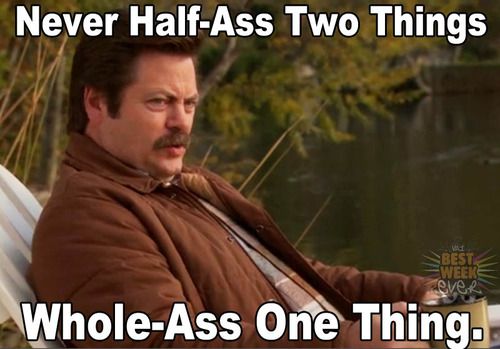
In my opinion, the worst thing a content creator can do is to stretch themselves too thin when starting out. This is why I have avoided starting a YouTube channel for so long.
I wish I had started YouTube sooner, like when I began earning more money from Monumetric and started outsourcing some content writing, but hindsight is always 20-20.
The simple truth is that your time is limited.
Until you can outsource tasks with resources from a blog or YouTube channel, you simply won't be able to compete at the same level as someone spending 100% of their focus on a single platform.
You also have to accept that everything has an opportunity cost, and diverting some attention from one business to start another inevitably hurts both in some way unless you can truly outsource everything.
But, as you start to make money with a blog or YouTube channel, life gets easier.
You can outsource content writing, marketing, or video editing to free up more time for entrepreneurial endeavors. In my opinion, this is the turning point where it makes sense to start diversifying.
Ah, right…diversifying. That's sort of the entire point of all of this in the end.
Algorithms, affiliate programs (lol Amazon), and trends change all the time. Having multiple irons in the fire is truly the best way to mitigate the risk that your income disappears overnight.
It doesn't matter if you blog or vlog, you will have ups and downs.
The key is to move 2 steps forward for every step backwards and to continually insulate your businesses from external sources of volatility and damage.
I have no idea how long this blogging thing or YouTube experiment will last for.
But, what I do know is that both platforms have been incredibly educational, have opened new doors, and are worth pursuing. I'm just excited to see where everything ends up in the future.
Do you currently blog, run a YouTube channel, or do both? I'd love to hear about your experiences, which one you prefer, and what you think is the best option for beginners.
Catch you guys in the next one!
Extra Reading:
- 40 Ways to Make Money Online in 2020.
- How to Make Money on YouTube in 2020.
- Blogging Income Report – How I Made More Than $7,000 Blogging in 2019.
